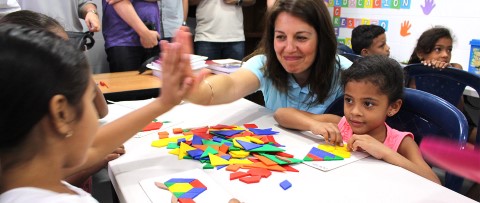- Thought Leadership


Susana Eshleman
CEO AND PRESIDENT
"Where, after all, do universal human rights begin? In small places, close to home … so close and so small that they cannot be seen on any maps of the world. Without concerted citizen action to uphold them close to home, we shall look in vain for progress in the larger world." — Eleanor Roosevelt
The former First Lady’s words still resonate as we celebrate Human Rights Day on Dec. 10 and as we mark the 71st anniversary of the proclamation of the Universal Declaration of Human Rights (UDHR). Her words cause me to think about human rights in the context of the programs Children International and our supporters make possible for vulnerable kids around the world.
I have the privilege of leading this global humanitarian organization. We help 200,000 children in 10 countries find a path out of poverty through programs focused on health, education, empowerment through life skills development and employment.
The correlation between human rights and poverty reduction may not be immediately apparent, but the link is powerful for one very simple reason: When people know about their rights, they are more likely to exercise them – and to demand and defend them when needed. Instilling the knowledge of basic human rights and nurturing the life skills and self-esteem needed to claim them are integral parts of Children International’s empowerment program.

Empowerment is one of the four pillars of our holistic approach to ending child poverty. The two key areas we focus on to measure success are “Life skills” and “Social responsibility.”
Whether it’s fostering important life skills like teamwork and empathy through organized sports, providing outlets for individual expression through arts programs, or teaching leadership skills and promoting community improvement projects led by democratically elected youth, our empowerment program creates meaningful, lasting change. We also use proven curriculum from partners like Aflatoun, which provides young people with social and financial education, including lessons about their rights and their responsibilities as citizens of the world.
Our staff in the Dominican Republic shared one of my favorite examples of youth empowerment. During a community forum organized to strengthen access to quality health care, delegates from various institutions, including local government and members of the community, gathered to discuss the issues. Enmanuel, 18 at the time, had been through our Youth Leadership training and was the only youth representative at the forum. The area coordinator for the National Health Service spoke, and Enmanuel recounted, “She said she would do us a favor and manage the government medicines. She said she would see what she could do.”
Respectfully, yet firmly, Enmanuel stood up and said,
“Thank you, but I want to be clear that we are not asking for a favor, we are requesting what is rightfully ours.”
Since universal health care is written into the constitution of the Dominican Republic, Enmanuel was simply speaking the truth. It is so heartening when previously voiceless youth from disadvantaged backgrounds find the confidence to stand up and be heard – for themselves, and on behalf of others.

Enmanuel’s story highlights the importance and effectiveness of empowerment, as well as the strength that comes from knowing one’s rights. When young people are equipped with knowledge of their basic human rights and taught how those rights come with the responsibility of not just acting on them, but being accountable by changing their own lives and the lives of those around them, they create a better world for all of us.


Eleanor Roosevelt, with a poster of the Universal Declaration of Human Rights. ©Wikimedia Commons
In celebrating this landmark in human rights, I see how small ripples of change can become powerful waves of transformation. This is true on both the individual level and at the larger, socio-political scale. Although we have an influential, long-term presence in the communities we serve, and sometimes we work with governments to improve those areas, it is not always our place to challenge some of the structural and governmental dynamics that can perpetuate poverty, such as economic or education policies.
But citizens of those countries, when empowered and given the opportunity, can be agents for positive, wide-sweeping change. I’m inspired by the stories of children and youth who pick up the mantle of empowerment. They motivate me to make sure we’re doing all we can to provide the tools they need to tap into their full potential.
For, as Ms. Roosevelt so eloquently implied, if we can promote universal human rights in small places, close to wherever our own homes are, that IS promoting them in the larger world. And whenever children are nurtured to realize their potential, they are also empowered, for good.
Comments
You must be logged in to comment. If you have an account, click here to log in.